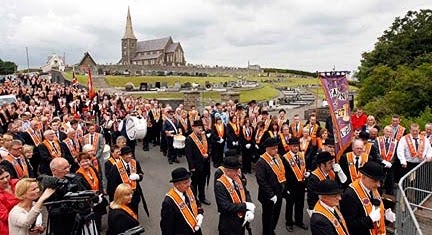Tribalism and Religion
 |
| Google Image |
“Hmmm. I don’t know about that battle,” you might say, “and I’m
pretty much up on news and recent history.”
That’s because it occurred on or about July 12, 1690, between two claimants to the
English (and Irish) throne, the Catholic King James and the Protestant, William
of Orange. William won. The Boyne is a river north of Dublin. William was from
the “House of Orange,” a royal line in Holland, and Protestant groups in
Ireland and Scotland long ago formed “Orange” lodges in his honor.
Their members are called “Orangemen,” and every year they march
through cities in Northern Ireland and Scotland to stick it to Catholics.
Before, after and during these parades, they pound exuberantly on drums, carry
signs and banners that provoke Catholics along their route and, in general,
exacerbate the ill feeling between Catholics and Protestants. It would be sort
of like holding an annual march in Atlanta to commemorate the North’s civil-war
victory over the South.
Anyway, the Irish and Scottish marchers seem to have missed the
part about loving your neighbor, a central tenet of Christianity, Catholic and
Protestant.
It’s no wonder that in Northern Ireland, especially, it has taken
centuries to overcome this animosity, which is often cited as evidence that
religion is no more than a cause of strife in the world. But if you think this
is about religion, you might also think tailgating is about football, charity
balls are about charity or the Irish Republican Army - the group associated
with Catholicism that has killed and maimed people in Ireland - is about
Catholicism.
I doubt if the majority of marchers have stepped foot in a church
in years and if they have, they weren’t paying attention. Most Protestants in
Northern Ireland belong either to the Presbyterian Church or Church of Ireland,
both of which believe in and promote the gospel values of love, tolerance and
solidarity. And the vast majority of people in Northern Ireland and Scotland
reject the marchers’ values.
A recent statement from the head of the Presbyterian Church of
Ireland, Dr. Michael Barry, reminded people that “we cannot serve others if we
are attacking them. We are to treat all people with respect and dignity because
they have been created in the image of God.”
 |
| Google Image |
I could say these marches are pure tribalism, but that would be
giving tribalism a bad name. They’re about “them versus us,” about desperately
trying to feel superior, not about the lessons of the gospel or any other
important part of the Christian message. They call to mind scenes in the
Sopranos TV series in which Tony and his pals faithfully attend masses,
baptisms and funerals before and after slaughtering their enemies or cheating
on their spouses.
It also calls to mind Jesus’ words about people of his own time:
“These people honor me with their lips but their hearts are far from me.”
Many people are turned off by religion because
they don’t like the religion’s teachings, but many others reject religion
because they see people who profess a faith they fail to express in their
lives.
The first obstacle should be more difficult to
overcome than the second because assuming some interest, a religion’s teachings
require study, prayer and thoughtfulness. But I believe overcoming the distaste
for failure to “practice what one preaches” is harder because the degree of
commitment to a faith varies widely and because it requires an honest look at
human nature.
Humans have ideals, but we don’t always measure
up. We want to follow our beliefs, but
get distracted by money, self-promotion, and sometimes bad relationships. Which
of us consistently and uniformly follows what we say we believe in?
This in no way justifies the marches, but to
avoid being judgmental, and to be faithful in our search for God, we have to acknowledge
what we are while striving to be who we say we are.
As for tribalism, loyalty to one’s “tribe” is
not in itself a bad thing. We feel loyalty to our family, friends, state,
country, and decreasingly for many, our employers, so why not our religion? The
problem is canonizing loyalty, elevating it to supremacy over the gospel values
of faith, hope and love.
That brings me to a point about the diversity of
religions, which I’ve written about before. Some people believe they’re all the
same, and that choosing one disparages all the others. First, the idea that
“they’re all the same” flies in the face of history, culture and the ability to
distinguish among many good choices. They simply aren’t all the same, just as
not all cars, cuts of meat and ways of living are the same.
And how is adherence to one religion an insult
to the others? That’s not how choices work. How is buying a Ford an insult to
Chevrolet buyers?
It’s true that the Jesus of the Gospels, as well
as the writings of Paul, urge unity among Jesus’ followers and many Christians
promote, and pray for, such unity. But Jesus is also quoted as saying, “Whoever
is not against us is for us,” “In my Father’s house there are many rooms,” and
“I have other sheep that are not of this fold.”
Genuine God seekers, acknowledging the
ambiguities in their own quest, respect all beliefs and all honest religions,
giving their adherents the benefit of the doubt about their sincerity and their
faith’s value. After that comes openness and thoughtfulness about which, if
any, religion could help in the search. Apart from lessons in what not to do, I
see nothing useful or helpful about the Orange marches.



Comments
Post a Comment